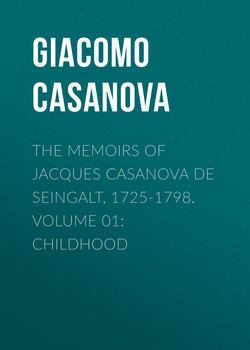The Memoirs of Jacques Casanova de Seingalt, 1725-1798. Volume 01: Childhood

Реклама. ООО «ЛитРес», ИНН: 7719571260.
Оглавление
Giacomo Casanova. The Memoirs of Jacques Casanova de Seingalt, 1725-1798. Volume 01: Childhood
CASANOVA AT DUX
TRANSLATOR'S PREFACE
AUTHOR'S PREFACE
CHAPTER I
CHAPTER II
CHAPTER III
CHAPTER IV
CHAPTER V
CHAPTER VI
CHAPTER VII
Отрывок из книги
A series of adventures wilder and more fantastic than the wildest of romances, written down with the exactitude of a business diary; a view of men and cities from Naples to Berlin, from Madrid and London to Constantinople and St. Petersburg; the 'vie intime' of the eighteenth century depicted by a man, who to-day sat with cardinals and saluted crowned heads, and to morrow lurked in dens of profligacy and crime; a book of confessions penned without reticence and without penitence; a record of forty years of "occult" charlatanism; a collection of tales of successful imposture, of 'bonnes fortunes', of marvellous escapes, of transcendent audacity, told with the humour of Smollett and the delicate wit of Voltaire. Who is there interested in men and letters, and in the life of the past, who would not cry, "Where can such a book as this be found?"
And not only are the Memoirs a literary curiosity; they are almost equally curious from a bibliographical point of view. The manuscript was written in French and came into the possession of the publisher Brockhaus, of Leipzig, who had it translated into German, and printed. From this German edition, M. Aubert de Vitry re-translated the work into French, but omitted about a fourth of the matter, and this mutilated and worthless version is frequently purchased by unwary bibliophiles. In the year 1826, however, Brockhaus, in order presumably to protect his property, printed the entire text of the original MS. in French, for the first time, and in this complete form, containing a large number of anecdotes and incidents not to be found in the spurious version, the work was not acceptable to the authorities, and was consequently rigorously suppressed. Only a few copies sent out for presentation or for review are known to have escaped, and from one of these rare copies the present translation has been made and solely for private circulation.
.....
I leave to others the decision as to the good or evil tendencies of my character, but such as it is it shines upon my countenance, and there it can easily be detected by any physiognomist. It is only on the fact that character can be read; there it lies exposed to the view. It is worthy of remark that men who have no peculiar cast of countenance, and there are a great many such men, are likewise totally deficient in peculiar characteristics, and we may establish the rule that the varieties in physiognomy are equal to the differences in character. I am aware that throughout my life my actions have received their impulse more from the force of feeling than from the wisdom of reason, and this has led me to acknowledge that my conduct has been dependent upon my nature more than upon my mind; both are generally at war, and in the midst of their continual collisions I have never found in me sufficient mind to balance my nature, or enough strength in my nature to counteract the power of my mind. But enough of this, for there is truth in the old saying: 'Si brevis esse volo, obscurus fio', and I believe that, without offending against modesty, I can apply to myself the following words of my dear Virgil:
I have had friends who have acted kindly towards me, and it has been my good fortune to have it in my power to give them substantial proofs of my gratitude. I have had also bitter enemies who have persecuted me, and whom I have not crushed simply because I could not do it. I never would have forgiven them, had I not lost the memory of all the injuries they had heaped upon me. The man who forgets does not forgive, he only loses the remembrance of the harm inflicted on him; forgiveness is the offspring of a feeling of heroism, of a noble heart, of a generous mind, whilst forgetfulness is only the result of a weak memory, or of an easy carelessness, and still oftener of a natural desire for calm and quietness. Hatred, in the course of time, kills the unhappy wretch who delights in nursing it in his bosom.
.....